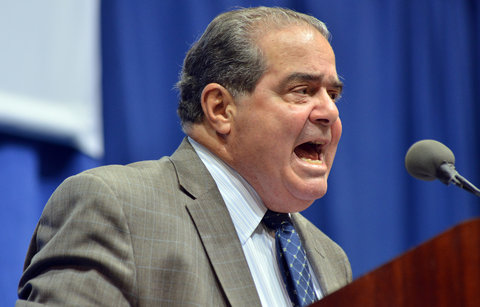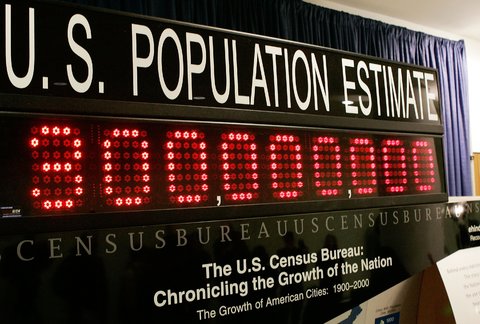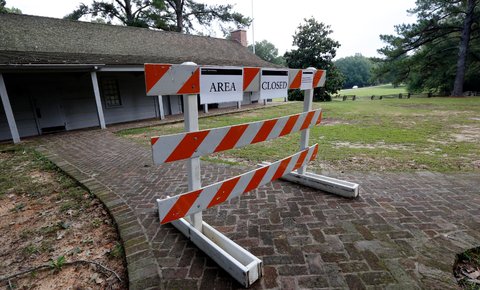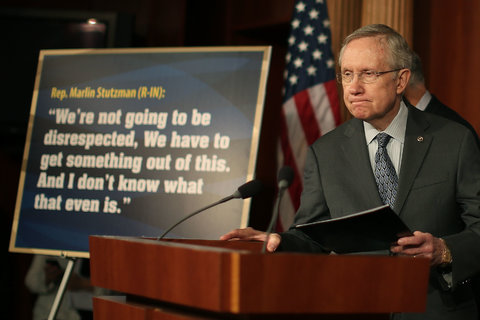 Josh Reynolds/Associated PressJustice Antonin Scalia at Tufts University on Oct. 2, 2013.
Josh Reynolds/Associated PressJustice Antonin Scalia at Tufts University on Oct. 2, 2013.Supreme Court Justice Antonin Scalia has seen the T.V. show “Duck Dynasty.” In an interview published on Sunday with New York Magazine’s Jennifer Senior, he said many people recommended it to him as a “great show” and he figured he’d “better look at it.” He also said he’d seen “The Sopranos,” plus a couple of episodes of “Mad Men,” and that he loved “Seinfeld.” “Oh, boy,” he said, “The Nazi soup kitchen? No soup for you!”
When it comes to the news, however, Justice Scalia seems less open-minded. In fact he confessed—not in so many words—to living in a conservative echo chamber.
What’s your media diet? Where do you get your news?
Well, we get newspapers in the morning.
Read more…
 Mark Wilson/Getty ImagesThe population clock at the U.S. Census Bureau hit the of 300 million mark on Oct. 17, 2006.
Mark Wilson/Getty ImagesThe population clock at the U.S. Census Bureau hit the of 300 million mark on Oct. 17, 2006.No one knows how the latest shutdown plus debt ceiling farce will end. But there is a way to try to stop the craziness from happening over and over again: Fund the census.
Seriously.
One reason that so many House Republicans have been eager to shut down the government and threaten default is that they have the backing of the voters in their districts. That suggests that entire districts are as misguided as the lawmakers who are holding the nation hostage. What happened to the wisdom of the crowd?
One answer is gerrymandering. After the 2010 elections gave Republican state legislatures a free hand in redrawing political maps, many districts were jiggered to be more white, more Republican and more insular. That’s a neat trick in a nation that is increasingly diverse. It also leads to more radicalism, because in several essentially one-party districts, primaries become the main contest, and the people who vote in primaries tend to be more ideological than those who turn out in general elections.
Read more…
 Rogelio V. Solis/Associated PressA barrier tagged with an explanatory note by the Natchez Trace Parkway in Ridgeland, Miss., on Oct. 2, 2013.
Rogelio V. Solis/Associated PressA barrier tagged with an explanatory note by the Natchez Trace Parkway in Ridgeland, Miss., on Oct. 2, 2013. The closing of 401 national parks, monuments, waterways and memorials (plus 561 national wildlife refuges) as part of the broader government shutdown has the public in an uproar and Republicans in (partial) retreat. On Tuesday, the House passed a bill to fund these facilities as one of several measures to open those parts of the government whose shuttering has drawn the most criticism — a truly cynical gesture that rightly found no traction whatever in the Senate.
“We’re truly sorry,” the Republicans seemed to be saying to the thousands of people, including overseas visitors, who were suddenly denied access to public treasures, from the Statue of Liberty in the East to Yosemite in the West. “We really love the parks.”
Read more…
 Chip Somodevilla/Getty ImagesOutside the U.S. Capitol on Oct. 2, 2013.
Chip Somodevilla/Getty ImagesOutside the U.S. Capitol on Oct. 2, 2013.The Republican shutdown of government is compounding what was already a disastrous year for Head Start, the federal program that prepares disadvantaged 3 and 4 year olds for school. This critically important program is already reeling from the sequester, the senseless across the board budget cuts that began last spring, which caused Head Start centers to scale back on transportation, basic learning materials and, in some cases, to even close their doors. According to the National Head Start Association, owing to the sequester cuts that began in March, 57,000 fewer children will have access to the program this year — with even deeper cuts to come if the mindless process of budget cutting continues.

A look at the widespread effects of the federal shutdown by members of the editorial board.
The shutdown is doing even more damage. According to the association, for example, the shutdown has prevented Head Start programs serving about 19,000 children across 10 states and Puerto Rico from accessing the federal funds that they had been awarded. Furthermore, programs in five states — Alabama, Mississippi, Connecticut, Georgia and Florida — have already shut down.
Read more…
 Mark Wilson/Getty ImagesHarry Reid next to a quote from Marlin Stutzman during a news conference on Thursday.
Mark Wilson/Getty ImagesHarry Reid next to a quote from Marlin Stutzman during a news conference on Thursday. Marlin Stutzman was, until today, a little-known Republican back-bencher, representing northeast Indiana in the House. But with just one off-message statement that he was quickly forced to retract, he became the prominent public face of the House Republicans who are refusing to re-open the United States government.
In a swift stroke, he managed to expose the complete hollowness of their crusade, which is ostensibly about dismantling health care reform but is really about humiliating President Obama and the Democrats, about winning something — anything — just to show a group of angry constituents that they are waging a fight against a hated political nemesis.
“We’re not going to be disrespected,” Mr. Stutzman said on Wednesday. “We have to get something out of this. And I don’t know what that even is.”
Read more…
 Saul Loeb/Agence France-Presse — Getty ImagesA “jobs” sign on the U.S. Chamber of Commerce Building in Washington, DC, on Aug. 2, 2013.
Saul Loeb/Agence France-Presse — Getty ImagesA “jobs” sign on the U.S. Chamber of Commerce Building in Washington, DC, on Aug. 2, 2013. The monthly employment report from the Bureau of Labor Statistics is the most important source of information on how the economy is delivering (or not) for the American people.
The shutdown, however, will stem the flow of information by postponing, indefinitely, the September report, originally scheduled for release on Friday, Oct. 4.
A late report means that businesses, investors, economists and policymakers are operating, if not in the dark, then in the gray. Jobs are key to consumer spending, which drives the economy; they are key to family well-being, which drives society; they are key to confidence, or lack thereof, in the economy and society, which drives momentum. By extension, the jobs report is singularly important; without it, decision making in all spheres will be less informed.
Read more…
 Verena Dobnik/Associated PressThe Gowanus Canal in Brooklyn, N.Y., a federal Superfund site, on Sept. 30, 2013.
Verena Dobnik/Associated PressThe Gowanus Canal in Brooklyn, N.Y., a federal Superfund site, on Sept. 30, 2013.It is far from clear how badly the country’s environment will be damaged by the government shutdown. But the immediate prospects are not promising.
Republicans who detest the Environmental Protection Agency were not bothered in the least by the fact that the agency furloughed more than 90 percent of its 16,000-plus full and part-time employees. But people living near toxic waste sites will be bothered. Forced to perform what amounts to emergency triage, agency officials said they had no choice but to stop work on about 500 of the nation’s Superfund sites, more than 60 percent of the total, with work proceeding only at those sites where industrial residues could get into the drinking water supply or present other immediate threats to human health. Work at sites presenting longer-term dangers will be set aside until funding is restored.

A look at the widespread effects of the federal shutdown by members of the editorial board.
Other important if less visible programs will also be affected. Because key personnel have to stay home, work on the E.P.A. rules governing greenhouse gas emissions from power plants will slow down. The agency’s Energy Star program — a voluntary program that helps businesses and individuals clean the air and protect the climate through energy-efficient appliances and buildings – is closed down, for lack of people and computers. Similarly, farmers and ranchers who want technical advice and financial credits for participating in vital land and soil conservation programs are finding phones unanswered, websites inoperative and doors closed at local Agriculture Department offices.
Read more…
 Usa.Gov/European Pressphoto AgencyThe USA.gov page when trying to open a NASA website on Oct. 2, 2013.
Usa.Gov/European Pressphoto AgencyThe USA.gov page when trying to open a NASA website on Oct. 2, 2013.When the federal government last shutdown in 1995, most agencies and departments had either no presence on the Internet or a very basic Web site. Since then, agency Web sites have become the primary public face of the government for most Americans who do not live in or near Washington. So it’s perhaps not surprising that the decision by agencies such as NASA and the Library of Congress to take down their sites this week has gotten a lot of attention.

A look at the widespread effects of the federal shutdown by members of the editorial board.
In keeping with the senseless nature of the shutdown, some Web sites are down while others are still up. The Federal Trade Commission, for instance, has blocked access to its site. It has posted a notice online saying that it’s closed indefinitely as are its systems for people to register complaints or enter telephone numbers on the do-not call list. By contrast, the Department of Education has left its site up with a notice informing visitors that it will not be updated during the shutdown. Sites for the White House, Treasury and the Internal Revenue Service, are being updated at least in part. (Here’s a pretty comprehensive list of which sites are up and which are not.)
Read more…
 David Burnett/G.P. Putnam Sons, via Associated PressTom Clancy in Huntingtown, Md., in 2010.
David Burnett/G.P. Putnam Sons, via Associated PressTom Clancy in Huntingtown, Md., in 2010.Tom Clancy, who died on Tuesday, was so popular — 17 of his novels were No. 1 New York Times best sellers—that his name meant something even to people who had never read a word of his work, a rare achievement for a contemporary writer. His name was a byword signifying spies, military equipment and covert plots against the American government.
Which is probably why so many Times writers invoked Mr. Clancy over the years, without introduction, to give their stories a little color. He was handy in a simile.
A few examples:
Anna Quindlen, “Informed Opinion,” Jan. 10, 1991: “We’ve played out military scenarios, analyzed polls and plumbed history, more like folks researching a Tom Clancy novel than plunging headlong into war.”
Maureen Dowd, “West Wing Chaperone,” Oct. 8, 2000: “If Dick Cheney were in a Tom Clancy-style thriller, he’d be the White House official who blends into the woodwork in the first act, only to quietly usurp the president in the second — the bespectacled puppetmaster who blackmails uncooperative congressmen, fakes authorizations for C.I.A. covert operations and makes deals with cartels.”
Read more…
 Josh Reynolds/Associated PressJustice Antonin Scalia at Tufts University on Oct. 2, 2013.
Josh Reynolds/Associated PressJustice Antonin Scalia at Tufts University on Oct. 2, 2013.













No Comment Necessary: What If the Government Defaults?
By THE EDITORSIn a Thursday report, the Treasury Department explained what would happen if Congress were to refuse to raise the federal debt limit.
Read the whole report here.